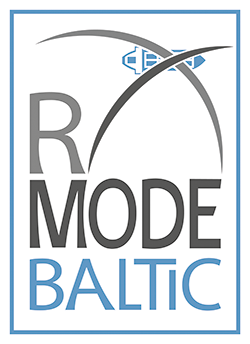R-Mode Baltic 2 (March 2021 – December 2021)
The R-Mode Baltic2 project is the follow-up of the R-Mode Baltic project, which implemented a test bed for a terrestrial positioning system called Ranging Mode (R-Mode) in the Baltic Sea. This new system allows positioning even in times when the Global Navigation Satellite Systems (GNSS) fail. This enhancement of reliable Position, Navigation and Timing (PNT) information is a key for safe navigation and new maritime applications.
Goal
The main goal of the R-Mode Baltic 2 project is the long-term evaluation of the R-Mode Baltic test bed and the testing of new R-Mode concepts. For this purpose the project consortium will increase the monitoring capabilities of the R-Mode Baltic test bed and equip ships with R-Mode ready receivers and maritime applications from the R-Mode Baltic project. This broadened network of static and dynamic monitoring stations will be used for extensive study of the R-Mode system performance over the project life-time of nine month. The results are essential to further develop the system into a reliable and world-wide accepted backup system for coastal navigation.
Activities
The R-Mode system will be adapted to support new R-Mode concepts which address main challenges of the system.
- With a two-way time transfer approach, using the R-Mode signals, the R-Mode system time shall distribute the time in a subset of the system, to ensure the robustness and decrease the dependence on external time sources that in most cases rely on GNSS.
- The concept of R-Mode transmitter real-time calibration will be implemented to improve the stability and quality of broadcasted R-Mode signals.
- Correction terms for the wave propagation known as additional secondary factors will be estimated in real-time and will be used by the on-board equipment for increased positioning performance.
The project will lead to: - an improved solution for safer shipping in case of intended or unintended interferences of GNSS;
- dissemination of results by workshop, conferences or other medias within the whole maritime community;
- appropriate inputs to relevant standardisation organisations;
- the usage of the R-Mode at European and world-wide level;
- an enhanced recognition of the Baltic Sea Region for innovative solutions suitable for the entire world.
The project strongly follows the EU Strategy of Baltic Sea Region in the Policy Area Safety and Security
R-Mode Baltic (October 2017 – March 2021)
Challenge
Maritime tasks need reliable on-board positioning systems
The Baltic Sea is one of the most frequented waters within Europe and plays an important role in connecting countries and people by ship routes. Even though many vessels are equipped with sensors and supporting systems for position and navigation purposes nowadays, accidents such as collisions and groundings still happen every year. Experts forecast an expansion in world trade and cruise market, construction of even larger vessels, and therefore a substantial increase in complexity of traffic situations at sea. Against this background, the user community has a high demand for reliable systems for position, navigation and time (PNT). International bodies such as the International Maritime Organisation (IMO) and the International Association of Marine Aids to Navigation and Lighthouse Authorities (IALA) are working together to have more reliable systems. Since shipping is connecting the whole world, any new idea or proposed solution can only be successful if its application potential covers transnational up to worldwide level.
Goal
A new maritime backup system for position, navigation and time purposes
The main goal of the R-Mode Baltic project is to develop and demonstrate of a new maritime backup system for position, navigation and time purposes. Therefore, the project consortium accepts the challenge to develop solutions for so-called Ranging Mode, or R-Mode, transmitter and receiver prototypes, for independent time synchronizations of broadcasting stations and for a testbed concept and its deployment within the project lifetime of 3 years.
The R-Mode Baltic project installs and promotes the first worldwide operational test area for a new maritime system for PNT as a backup for Global Navigation Satellite Systems in the Baltic Sea. The reason to do this is induced by the fact, that all Global Navigation Satellite Systems are highly vulnerable to jamming and interference and that in time no other system can undertake the task for absolute positioning in case of a temporal loss of Global Navigation Satellite Systems.
As a first step towards the alternative usage of existing positioning systems, a user-driven testbed in the Baltic Sea shall be installed based on broadcast signals transmitted via modified IALA beacons and AIS base stations. The great advantage of this approach is the evolution of existing maritime infrastructure without any handling and utilisation constraints and its potential for a worldwide use within the service vicinity of such stations.
Activities
The project consortium takes action
The following activities will be undertaken to reach the envisaged goal:
- following the IALA roadmap of R-Mode, project partners demonstrate the best options for the implementation of R-Mode on existing IALA beacons and AIS base stations and how they can be sufficiently synchronized in time;
- prototypes of R-Mode station equipment are developed and used to equip the R-Mode Baltic Sea testbed which is available after project closure;
- prototypes of R-Mode user equipment are developed and used for the demonstration of this technology for resilient PNT data provision;
- the knowledge gathered about R-Mode is distributed by workshops, seminars, conferences and freely available documents within the whole maritime community;
- inputs for standardization bodies are generated to integrate R-Mode functionalities in existing standards on IALA beacons and AIS base stations. This enables maritime administrations worldwide to enhance their existing maritime infrastructure accordingly so that maritime user can use R-Mode as a worldwide available service for resilient PNT data provision.
The project duration is 36 months (October 2017 – September 2020) and the total budget is 3.4 M€, which is partly funded by the EU’s Interreg Baltic Sea Region Programme. Due to the COVID-19 pandemic, the project duration was extended by 6 months until March 2021 without additional funding.

